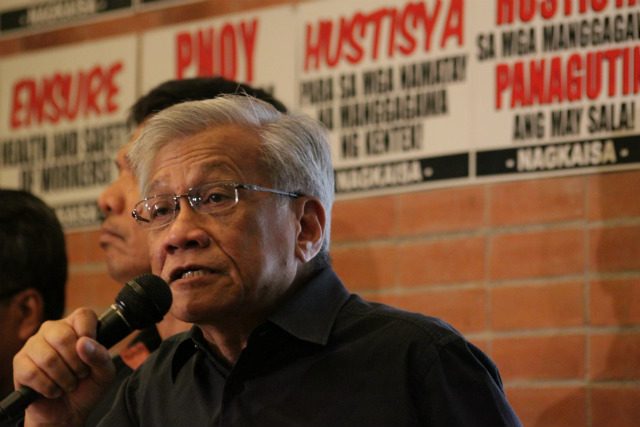SUMMARY
This is AI generated summarization, which may have errors. For context, always refer to the full article.


MANILA, Philippines – Resigned Akbayan Representative Walden Bello on Tuesday, May 19, said the massive Valenzuela factory fire which claimed at least 72 lives should be made “a rallying point” to pass in Congress a bill ensuring workers’ security of tenure.
In a press conference of labor coalition Nagkaisa, Bello cited the lack of political will on the part of past and present administrations to certify as urgent such a pro-worker legislation.
Under the Constitution, workers are guaranteed security of tenure or the right against termination without just cause and due process.
Alternative hiring set-ups, however, are exploited by some unscrupulous employers to misclassify workers and deny them regularization and law-mandated workers’ benefits.
In the case of rubber slipper maker Kentex Manufacturing, whose two-story factory in Valenzuela caught fire last May 13, family members of casualties attested to the pakyawan system where the factory owner tapped a “handler” to recruit factory workers without the necessary job contracts and worker protection required by law.
The DOLE also found that Kentex’s subcontractor CJC Manpower Services was not only unregistered but “underpaying its workers.”
The deadly factory fire is seen as a setback for the Philippine manufacturing industry and sheds light on the alleged lax implementation of occupational safety and health standards in local sweatshops.
Other factories and plants line the area in the village of Ugong in Valenzuela where the Kentex factory is located. Villagers in house clothes and slippers congregate in front of tall gates to enter sweatshops where they work as low-wage earners.
Bello said the incident provides an opportunity for pro-worker groups to push for reforms, adding that employers still hold sway over some lawmakers even at the House committee on labor and employment of which he was a member.

Pending bills
Bello himself introduced a version of the Security of Tenure bill, which was re-filed in the 16th Congress as House Bill 573 and which seeks to limit the number of contractual workers at 30% of any company operating for more than a year.
The bill seeks to regulate job contracting, a system allowed under Article 106 of the Labor Code and which involves workers being outsourced from capitalized general contractors.
Sought to be amended, the country’s 41-year-old Labor Code allows for job contracting and subcontracting.
Under Bello’s proposed law, job contracting will be used only for positions that are not necessary and desirable in the ordinary course of a company’s operations. Otherwise, workers must be regarded as regular employees of a company.
It “recognizes subcontracting as a valid business practice but also protects workers from unscrupulous and unnecessary subcontracting,” Bello had explained.
Pending measures in relation to workers’ job security are also before Congress, charging forward at a snail’s pace.
(Read House Bill 573)
DOLE draft bills
Department of Labor and Employment (DOLE) spokesperson Nicon Fameronag on Tuesday explained that the department has also drafted a “compromised version in 3 parts” of legislation in relation to job security.
The “alternative measure” takes into account the “highly contentious features and political underpinnings of the pending SOT (Security of Tenure) bills,” a separate DOLE statement read.
The draft bills specify the requirements of legitimate job contracting and subcontracting and shifts from registration to licensing of contractors or subcontractors, among others.
Currently, job contracting and subcontracting is subject to regulations under DOLE Department Order (DO) 18-A series 2011. It provides that both the principal and the subcontractor would be administratively liable for any labor law violations.
DO 18-A was issued by Baldoz after a stalemate in negotiations prevented legal reforms on job contracting to push through.
A draft bill that sought to protect contractual workers’ rights and address perennial issues raised by labor groups was stuck at the National Tripartite Industrial Peace Council, headed by Baldoz with members representing the labor and employers’ sectors.
The department order sought to harmonize polarized views from the two sectors.
Some labor groups called for a complete end to all forms of contractual work, while employers argued that such hiring arrangements are permitted under the Labor Code and is well within their right to make management decisions.
Arturo Guerrero III of the Philippine Association of Legitimate Service Contractors had explained before a House panel that certain products and services are seasonal, creating the need for alternative hiring set-ups such as job contracting. – Rappler.com
Add a comment
How does this make you feel?
There are no comments yet. Add your comment to start the conversation.